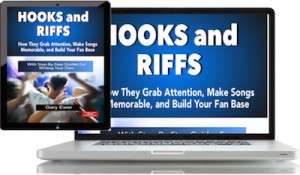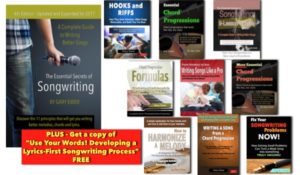A number of years ago I was teaching music in the public school system. I had several choirs. One of them, a medium-sized high school auditioned choir (45 members), rehearsed with me once a week for two hours. Another was a smaller jazz choir (20 members), which rehearsed twice a week, but only 35 minutes per session — roughly half the amount of rehearsal time the other choir received.
Most the members of my jazz choir were also members of the high school auditioned choir. But here’s the curious thing: the jazz choir, with its approximately one hour of rehearsal time per week, learned music quicker, and retained more, than the larger choir which had about double the rehearsal time.
 “Hooks and Riffs: How They Grab Attention, Make Songs Memorable, and Build Your Fan Base” shows you how a good hook can make the difference between songwriting success and failure. With great examples from pop music history.
“Hooks and Riffs: How They Grab Attention, Make Songs Memorable, and Build Your Fan Base” shows you how a good hook can make the difference between songwriting success and failure. With great examples from pop music history.
Education theory tells us that, most of the time, breaking one large task into several shorter sessions results in a more effective use of time. The longer we spend on any one task, the more we tend to succumb to boredom, and the less efficiently we work.
There’s a short article from about 12 years ago that describes this, which you may want to read: “The Science of Studying” on the “Study Hacks Blog.”
The Length of Your Songwriting Sessions
I would make the case that the same holds true for songwriting sessions. I really believe in scheduling your songwriting as a way of making sure that you give it the attention it needs in order for you to improve.
But a problem can when you set aside one large chunk of time per day: you become less efficient, your thinking slows down, and important abilities such as retention and creative thinking can diminish.
If you’re in the process of working out a songwriting timetable for yourself, try to schedule a couple of shorter sessions per day, rather than requiring yourself to work for one long session. Or simply shorten your existing session and take up the task the following day.
Shorter sessions mean:
- you help to prevent creative frustration from building;
- you keep your creative mind fresh and energetic;
- you allow downtime for musical ideas to develop in your creative mind;
- you prevent boredom;
- you make it more likely that you will stay focused on your creative tasks for that songwriting session.
Working out your songwriting schedule is a highly individualized task, and it may take some experimenting. You might find that 2 short sessions in one evening, with an hour-long break in between, feels right, while other songwriters might need longer breaks.
In fact, you may find that making the best use of your time means having one short session per day, with many hours of downtime in between. In the study referred to in “The Science of Studying”, scientific experiments revealed that a 1-day break was optimum.
If you’ve been doing all your songwriting in one long session per day, the 1-day break simply means that you should simply shorten your session. How short? When frustration begins to set in, you know it’s time to give yourself a break.
What I found with my jazz choir is that they learned faster, and retained more, when they had two 35-minute rehearsals. The 2-hour rehearsal was generally less effective, certainly after one hour of work.
 Written by Gary Ewer. Follow Gary on Twitter.
Written by Gary Ewer. Follow Gary on Twitter.
 Each eBook in “The Essential Secrets of Songwriting” 10-eBook Bundles shows you the fundamental principles that make great songs great.
Each eBook in “The Essential Secrets of Songwriting” 10-eBook Bundles shows you the fundamental principles that make great songs great.











Hi Gary
I’ve loved music all my life and have recently, following my retirement, started to get ideas for songs, lyrically and melodically. I have never played an instrument although I’m now starting to learn acoustic guitar, which I love. I’m really frustrated as to how I can get the ideas I have in my head onto say a music sheet, or a recording. I’m now working with my guitar teacher, who has his own studio, in an attempt to try and get something down. My problem is I can only explain what’s in my head by singing it and him trying to fit it onto an instrument. Can your ebooks help regarding chords for example if I can’t play an instrument? I’ve now got 5 songs written but no way of getting them heard or listened to. HELP
Hi Alan:
Learning an instrument is a great first step to getting the music that’s in your head heard by others. The better you are with your instrument, the better you’ll be able to communicate those ideas.
Learning music theory is also a very good step to take, because theory has more to do with communicating musical ideas than practically anything else. There are many songwriters who don’t read or write music, and they use their instrumental abilities to convey their melodies, etc.
My ebooks are written to be understood by songwriters whether they read music or not. Their biggest benefit comes from the fact that you’ll learn a lot about how and why good songs are good, and they give you literally hundreds of examples of songs to facilitate your learning.
My “Easy Music Theory” course is a video-based course in the rudiments of music that I think you’d find helpful as well. The best thing to do at this moment is to study a bit of theory and definitely keep playing guitar, and do whatever you can to learn as many chords as possible.
Hope this helps, and all the best to you Alan!
-Gary